Medical expert of the article
New publications
Preparations
Antibiotics for sore throat: what tablets to treat tonsillitis, names
Last reviewed: 04.07.2025

All iLive content is medically reviewed or fact checked to ensure as much factual accuracy as possible.
We have strict sourcing guidelines and only link to reputable media sites, academic research institutions and, whenever possible, medically peer reviewed studies. Note that the numbers in parentheses ([1], [2], etc.) are clickable links to these studies.
If you feel that any of our content is inaccurate, out-of-date, or otherwise questionable, please select it and press Ctrl + Enter.
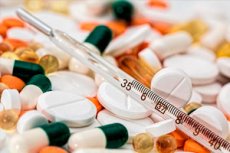
Antibiotics for tonsillitis are used to reduce the symptoms of the disease, prevent complications (paratonsillitis, rheumatic fever), and speed up recovery.
Angina is an acute infectious disease that mainly affects the palatine tonsils. The causative agent of the disease is usually streptococcus. Angina is especially common in children, adolescents, and young people. The cause of the development of angina is severe hypothermia, as well as chronic inflammation of the tonsils (tonsillitis). A person with angina should have separate dishes and avoid close contact with other people (children).
Angina can be not only an independent disease, but also one of the symptoms of common infectious diseases - diphtheria, scarlet fever or a manifestation of a blood disease (leukemia). Therefore, at the first symptoms of the disease, you need to consult a doctor to exclude the development of more serious diseases.
When treating the disease, the use of antibiotics, antipyretics, vitamins, and immunostimulants is important.
Antibiotics are prescribed if there is plaque on the tonsils, tenderness of the cervical lymph nodes, high temperature, and no cough. If there are at least three of the previous signs, antibiotics are prescribed without microbiological examinations; if there is one or maximum two signs, antibiotics are prescribed only if the examination results are positive.
Are antibiotics necessary for sore throat?
Tonsillitis is a bacterial disease, which is why it occurs in such a severe form. The main thing for this disease is timely treatment, since this, first of all, will help alleviate the patient's condition, secondly, will prevent possible severe complications, and thirdly, will speed up the recovery process.
Antibiotics can be used both general and local. Treating angina only locally can aggravate the course of the disease, in addition, a small concentration of the drug causes rapid addiction of bacteria, which will complicate further treatment.
If we talk about whether antibiotics are necessary for tonsillitis, then there can be no alternative in treatment. Streptococcal infections that are not treated with antibiotics can cause severe complications in the heart, rheumatism, and extremely high temperatures. Therefore, the use of antibiotics is mandatory, especially for such a severe disease as tonsillitis.
Read also:
What antibiotics should be taken for tonsillitis?
The streptococcal bacteria that cause sore throats are more sensitive to penicillin, so doctors often recommend these medications.
Amoxicillin is a drug of the penicillin group. The advantage of the drug is that it is available in various forms: tablets, syrups, capsules. This is especially convenient for treating small children, who sometimes find it quite difficult to give an injection or persuade to take a pill.
Amoxiclav is a form of amoxicillin containing clavulanic acid, which enhances the effect of the drug.
In cases where there is penicillin intolerance (allergy) or bacteria are not sensitive to penicillin, antibiotics of the macrolide group are usually prescribed. Antibiotics of this group are highly effective, low-toxic, and destroy a large number of microorganisms. The first drug of this group was erythromycin, but now more well-known drugs are sumamed, zitrolide, and hemomycin, which are analogs of erythromycin.
Names
If there is no allergy to penicillin, then it is best to use drugs of this group, as they are less harmful to the body. Amoxiclav, Amoxicillin show good results.
Amoxiclav is the most effective drug, as it is a new generation antibiotic. However, in some cases it happens that penicillin cannot be used (the causative agent of angina is resistant to the substance, allergy to penicillin, etc.), so other broad-spectrum antibiotics are used: klacid, lendacin, sumamed, cephalexin, siflox, erythromycin, cefazolin.
If you do not start antibacterial treatment for tonsillitis, it can lead to serious complications (otitis, glomerulonephritis, sinusitis).
Antibiotics for sore throat significantly improve the patient's condition in the first hours after taking. At a very high temperature, you also need to take an antipyretic, painkillers, which will help relieve headaches, weakness, etc. It is not recommended to bring down the temperature below 38 degrees with drugs, since at this time the body is intensively producing antibodies to fight the disease.
Penicillin series
Penicillins were among the first antibiotics that people began to use. In modern times, some penicillin drugs have already lost their effectiveness due to bacteria developing resistance to them, but important advantages that distinguish them from other antibiotics encourage specialists to invent new drugs based on penicillin.
The advantages of these antibiotics include their low harm to the body, a wide spectrum of action, and high antibacterial activity. Side effects from penicillin occur much less frequently than when treating with other antibiotics. Side effects usually manifest themselves in the form of allergies, intestinal microflora disorders, and sometimes inflammation at the injection site. Penicillin cannot be used by people with a tendency to various allergic reactions or bronchial asthma.
Most drugs of the penicillin group are used only in the form of injections, since the acidic environment of the stomach strongly destroys them, and they lose their effectiveness, especially biosynthetic drugs (produced by biosynthesis). The only exception is phenoxypenicillin, which is resistant to an acidic environment and can be taken orally.
Penicillin preparations should be combined with other drugs with caution; it is contraindicated to take them simultaneously with some antibiotics. Penicillins are mainly prescribed for the treatment of diseases caused by gram-positive bacteria (staphylococci, streptococci, pneumococci).
Amoxicillin
Throat diseases caused by bacteria can occur against the background of viral infections or independently, which can lead to severe manifestations of tonsillitis.
Amoxicillin is often used for bacterial throat infections and sore throats and is a widely used antibiotic.
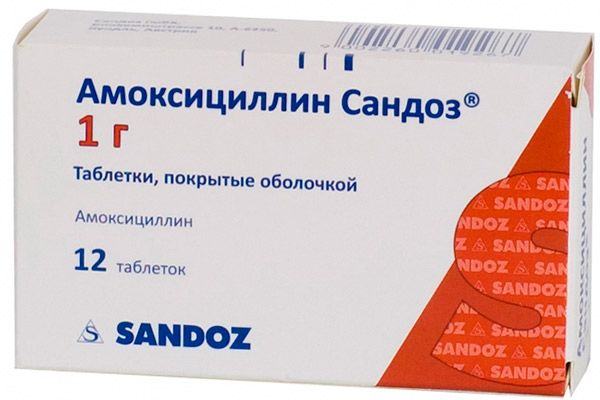
The antibiotic is effective against a large number of bacteria that cause sore throats. Doctors prescribe amoxicillin as a first-line drug because it is quite effective and has few side effects.
Side effects that may occur when taking amoxicillin include vomiting, diarrhea, and upset stomach. The most severe reactions to the drug include leukopenia, pseudomembranous colitis, agranulocytosis, and anaphylactic shock.
Sumamed
Sumamed is a fairly strong antibiotic, with a broad spectrum of action, and, in addition, this drug is one of the new developments, which is more effective against bacteria, in comparison with “older” versions of antibiotics.
The drug is available in the form of tablets, suspensions, injections. Sumamed for sore throat should be taken only once a day, which is quite convenient.
But sumamed has a number of contraindications. Some components of the drug can cause quite severe allergic reactions. When taking the drug, nausea, vomiting, abdominal cramps, diarrhea may occur, but such reactions are observed quite rarely.
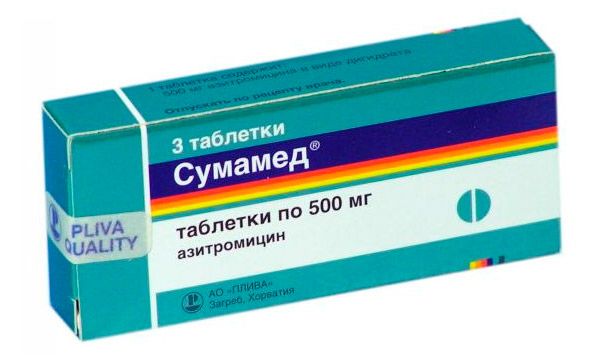
The course of treatment with sumamed usually does not exceed 5 days, for children the dosage of the drug is determined at the rate of 10 ml of syrup per 1 kg of weight. This dose is calculated for three days, after which the dosage is doubled. The antibiotic is taken an hour before meals or 2-3 hours after meals. Children under 16 years of age are not prescribed the drug in the form of injections.
When treating children, it is important to take probiotics along with sumamed, which will help maintain intestinal microflora.
The drug is effective not only for infectious throat lesions, but also for pneumonia, bronchitis, skin diseases, diseases of the genitourinary system, and peritonitis.
Before prescribing the drug, the doctor must take a smear to check the microflora and the susceptibility of bacteria to the drug.
Amoxiclav
Amoxiclav is a unique drug in its antimicrobial action. It is widely used to treat infectious diseases, especially in children, starting from three months.
The drug is prescribed if there are no allergic reactions to penicillin antibiotics, the course of treatment is prescribed by a doctor, individually in each case. The dosage of the antibiotic depends on the age and weight of the child. When taking amoxiclav, relief comes quickly: the throat stops hurting, the general condition improves.
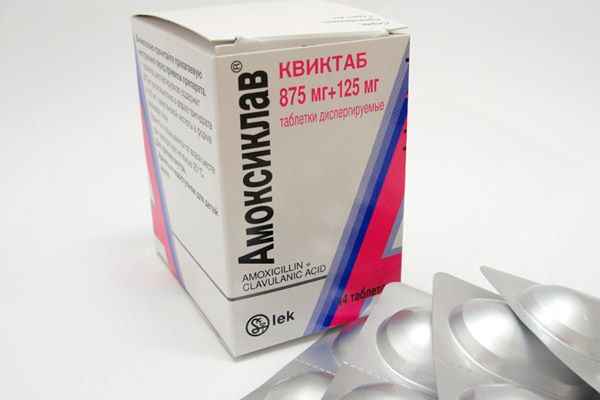
The drug owes its effective properties to two active substances in its composition (clavulanic acid and amoxicillin), which is why amoxiclav works better than other drugs.
Flemoxin
Flemoxin effectively fights the inflammatory process and destroys the infection. Quite often, Flemoxin is used independently, without a doctor's prescription.
Flemoxin is an antibacterial medicine that can be taken by children of all ages, as well as adults. The drug can also be prescribed during pregnancy.
Flemoxin is a broad-spectrum antibiotic, effectively destroys pathogenic microflora, acts against both gram-positive and gram-negative bacteria. After taking the drug, the maximum concentration in the blood is observed two hours later. Flemoxin is not susceptible to the acidic environment of the stomach, is excreted from the body by the kidneys in about 8-10 hours, in children under one year, the elimination of the substance occurs twice as fast.
The drug is available in the form of tablets and suspensions. When taking Flemoxin, you must strictly observe the hours of administration - the drug must be taken either an hour before meals or a couple of hours after meals. If the disease is mild or moderate, then the treatment lasts about a week, more severe conditions require taking the drug for about 10-14 days. The course of treatment cannot be interrupted, even if you feel significant relief on the 3rd - 4th day of treatment. It is quite difficult to completely destroy the infection in the body, this requires a certain amount of time.
The drug is not used in case of high sensitivity to the components, kidney and liver diseases, as well as infections that are accompanied by inflammation of the lymph nodes.
 [ 16 ]
[ 16 ]
Flemoxin solutab
A correctly selected drug allows you to quickly alleviate the patient's condition and completely destroy the infection in the body.
A semi-synthetic antibiotic of the penicillin series with a bactericidal effect is widely used to treat angina. Flemoxin salutab effectively fights staphylococci, which lead to the development of angina. The active substance of the drug is amoxicillin. Flemoxin salutab is used both for angina and for other infectious and inflammatory diseases of the respiratory system, genitourinary system, skin, which are caused by microorganisms sensitive to the drug.
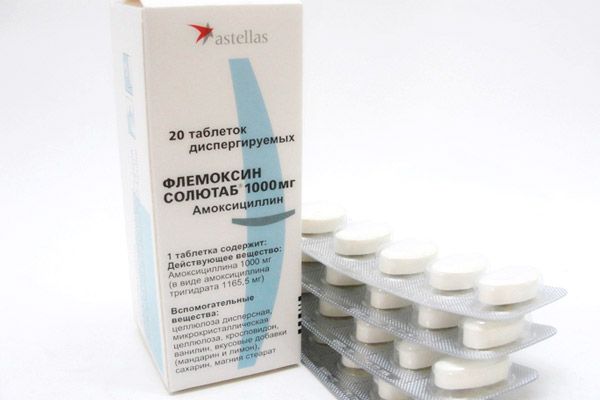
Flemoxin salutab has good acid resistance, the dosage of the drug is prescribed by the doctor individually, based on the severity of the disease. Usually, for mild and moderate cases of the disease, the course of treatment lasts 5-10 days, in more severe cases - 10-14 days. The drug should be taken even after the disappearance of severe manifestations of the disease (fever, sore throat), otherwise, microorganisms will quickly develop resistance to the drug, which will complicate treatment in the future. If there is no improvement in the first 3-4 days when taking Flemoxin, it must be replaced with another antibiotic.
Flemoxin salutab is contraindicated in infectious mononucleosis, leukemia, and intolerance to some components of the drug.
The use of the drug extremely rarely provokes side effects (nausea, vomiting, diarrhea, allergies).
Augmentin
Augmentin (amoxicillin-clavulanate) is a fairly effective antibacterial agent. The drug is usually used to treat sore throat in children. The drug contains two active substances at once - amoxicillin and clavulanic acid, which distinguishes it from others.
Amoxicillin is a semi-synthetic antibiotic of the penicillin group, with a broad spectrum of action against a large number of gram-positive and gram-negative bacteria. Clavulanic acid has a structure similar to penicillin, it effectively eliminates beta-lactamase enzymes produced by pathogenic bacteria to develop resistance to antibiotics. It is due to this acid that amoxicillin does not break down under the action of enzymes, which extends its effect to a larger number of bacteria that are resistant to amoxicillin and other drugs of the penicillin group.
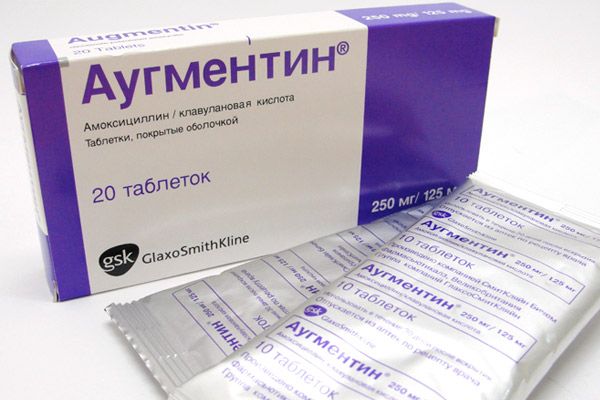
Augmentin has all the properties of an antibiotic, which has a bactericidal effect on many microorganisms, plus it eliminates the action of beta-lactamases.
The drug is available in the form of tablets, injections, suspensions. The dosage for treating children is determined depending on the age and weight of the child.
Cephalexin
The drugs in this group, such as cephalexin, are convenient because they can be taken regardless of food intake. An adult patient is recommended to take no more than 2 g of the drug per day. The dose should be divided into several doses (usually 3-4). In severe cases of the disease, the dosage is increased to 4 g per day. In childhood, the dosage depends on body weight and is 25-50 mg per kilogram, the drug intake should also be divided into several. If the disease is severe, the dosage is increased to 100 mg.
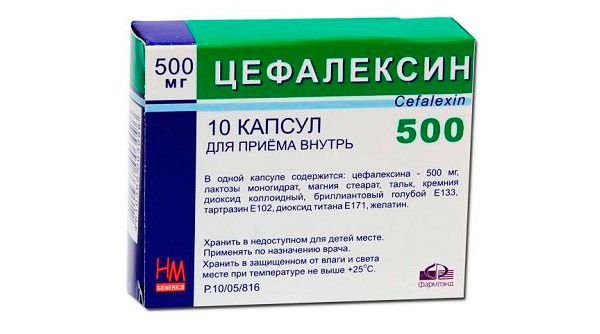
The recommended dosage should be reduced in case of impaired renal excretory function. The course of treatment with cephalexin is from 7 to 14 days, on average streptococcal infections are treated for 10 days.
Local antibiotics for tonsillitis
Angina is a general infectious disease in which there is severe local inflammation in the throat. The use of local therapy in the treatment of a general disease will be ineffective. Treatment of angina should be at a general level: rest, plenty of fluids, antibiotics. Local treatment (throat irrigation with aerosols, special lozenges, gargles, etc.) should be added to the general treatment to achieve maximum results in treatment.
Can Bioparox be used?
Bioparox can be used in the treatment of angina only in combination with general treatment. Antibacterial agents at the initial stage of the disease (before the formation of pus) are the first and main direction in treatment. Usually, Bioparox is used in the treatment of angina extremely rarely, since there is no need for additional treatment against the background of general therapy.
Bioparox is used for the complex treatment of chronic tonsillitis (inflammation of the tonsils). The drug is used for no more than 10 days. As with the prescription of other antibiotics, it is necessary to identify the susceptibility of pathogens to it. Without such an analysis, the treatment of infections with inflammatory processes can lead to serious consequences: complete destruction of beneficial microflora in the throat, which restrained the proliferation of pathogenic bacteria, after which microorganisms begin to multiply with greater force, which will lead to severe inflammation.
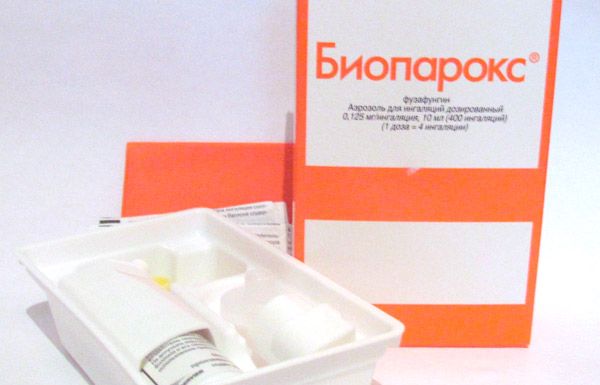
 [ 22 ]
[ 22 ]
How to use Bioparox correctly to treat chronic tonsillitis?
Bioparox should not be used without supervision. Only a specialist can recommend the drug for treatment. Bioparox helps well in the complex treatment of chronic tonsillitis (inflammation of the tonsils).
It is usually prescribed for one session for adults every four hours, for children - every six hours. A session means oral inhalation, which requires a special nozzle that is put on the bottle and placed in the oral cavity closer to the inflamed tonsils. After this, two presses are made to irrigate one tonsil, then two presses - for the other. After use, the nozzle must be washed in running water.
Antibiotics for sore throat in children
Antibiotics for sore throat in children should be prescribed depending on what is the cause of the disease: a virus or streptococcus bacteria. As a rule, visual examination does not show the difference, streptococcus bacteria can only be detected by a special test (bacteriological culture).
In some cases, antibiotic treatment can be used in small patients, but such treatment does not always have a positive effect. First of all, antibiotics, when destroying the virus, have a detrimental effect on the baby's immature immune system. With a sore throat caused by a viral infection, the body is quite capable of coping on its own, it is only necessary to provide the child with complete rest, plenty of fluids, and adequate vitamin nutrition. With streptococcal sore throat, you will most likely need to take a course of antibiotics, which are necessary to prevent the development of more severe complications.
Read more about the use of antibiotics in children here.
 [ 23 ], [ 24 ], [ 25 ], [ 26 ], [ 27 ]
[ 23 ], [ 24 ], [ 25 ], [ 26 ], [ 27 ]
Treatment of tonsillitis in adults
Many people are skeptical about antibiotics, believing that the harm to the body from them far exceeds the benefit. This makes some sense, because antibiotics destroy not only pathogenic microorganisms, they also destroy the microflora that is beneficial to our body - as a result, dysbacteriosis develops. Also, the use of antibiotics can provoke severe allergic reactions.
But, unfortunately, some diseases cannot be cured without the use of antibiotics. Antibiotics for sore throat, especially if pustules have appeared on the tonsils, an extremely high temperature has risen, general weakness has begun against the background of intoxication of the body, are simply inevitable. But it is necessary to take antibiotics correctly in order to reduce the possible side effect. The usual course of antibiotic therapy is about 7 days. But many people stop taking the drug immediately after the disappearance of severe symptoms in order to reduce the negative impact on the body from taking antibiotics. Such a decision is fundamentally wrong and can cause serious complications. Even after the signs of the disease have disappeared (sore throat, weakness, fever), the infection continues to "sit" in the body. If you stop taking antibiotics, the disease may relapse, which will require more serious treatment since the microorganisms have already developed resistance to a certain type of antibiotic. Angina is often complicated by heart disease and rheumatism, since bacteria spread not only in the main source of inflammation - the throat, but throughout the body and penetrate all organs.
When taking antibiotics, you need to stick to a certain schedule, otherwise it threatens the development of a severe inflammatory process. In this case, you will need to use drugs whose negative effect on the body will be much stronger.
To reduce the negative effects of taking antibiotics, you need to take special medications from the first days of treatment to restore the intestinal microflora, as well as the liver.
Duration and treatment regimen for various forms of tonsillitis
The course of treatment with antibiotics depends on the drug, the stage of the disease, the severity of the process, the state of the person's immunity, etc. The average course of treatment is 10 days.
For mild to moderate tonsillitis, antibiotics are recommended to be taken for 5-7 days. In more severe cases, it is recommended to continue treatment for 10-14 days.
Antibiotic treatment should not be stopped after the condition has improved, the temperature has dropped, and the sore throat has disappeared. It is extremely important to complete the full course of antibiotic treatment so that the infection in the body is completely destroyed.
This is necessary, first of all, to prevent relapses of the disease. If angina is not treated properly, there is a risk of repeated inflammatory process in the body, but pathogenic bacteria in this case will already develop resistance to a certain group of antibiotics, and a change of drug and a repeated course of treatment will be required. Also, angina can be complicated by quite serious heart diseases, rheumatism.
In any case, you need to take the medicine as long as the doctor prescribed. You cannot change the dosage or the duration of treatment on your own.
Purulent tonsillitis
Angina can appear at any age, usually one tonsil is affected more than the other. If left untreated, angina can become purulent and worsen with severe complications to the heart.
With purulent tonsillitis, severe pain in the throat appears, which intensifies over time, swallowing is difficult, the temperature rises (sometimes to very high levels). The tonsils become bright red, with whitish purulent foci. The submandibular lymph nodes also swell.
The complex treatment also includes the prescription of antibiotics for tonsillitis that has acquired a purulent form. Drugs from the penicillin and cephalosporin groups are prescribed.
The most effective against the causative agents of angina (group A streptococci) are penicillin drugs, which must be taken for 10 days. For purulent angina, other penicillin drugs can be used, such as augmentin, azithromycin, ampicillin.
A synthetic derivative of penicillin is the drug amoxicillin. It does not kill bacteria, but stops their growth by destroying the cell walls.
Cephalosporin antibiotics are chemically similar to penicillin drugs. The antibiotic Cephalexin prevents the formation of the cell wall that is necessary for the survival of bacteria, which ultimately leads to their death.
Erythromycin and tetracycline are used in cases of allergic reactions to penicillin and its derivatives. Erythromycin is a broad-spectrum antibiotic that is effective against many bacteria. It resembles penicillin in its antibacterial activity, so it is a good alternative for people with penicillin intolerance.
Tetracycline disrupts protein synthesis, which prevents bacteria from multiplying. This drug is used in cases of penicillin intolerance to treat most bacterial infections.
Read the full article about the names and methods of using antibiotics for purulent tonsillitis here.
Follicular tonsillitis
Follicular tonsillitis affects the tonsil follicles, externally you can see their strong enlargement, swelling. Purulent follicles are visible, which can be white or dirty yellow (depending on the duration of the disease). The pustules are small in size - about 1 - 2 mm. After the pustules break through, a whitish coating appears on the tonsils.
The causative agent of the disease is most often streptococcal or pneumococcal infection. The disease develops in the case of a decrease in the body's defenses, hypothermia, infection in the oral cavity. Follicular tonsillitis can affect both adults and children, but in childhood the disease occurs most often and has some features. Basically, the disease develops during the cold season - autumn-winter.
When treating follicular tonsillitis, it is necessary not only to destroy the infection in the body, but also to remove intoxication. At the first signs of the disease, it is necessary to stay in bed and drink more fluids. In order not to irritate the sore throat, you need to eat mainly liquid food, in small portions.
The modern pharmaceutical industry offers a wide range of drugs for the treatment of infectious diseases in both adults and young children.
The most common drugs for the treatment of sore throat are Erythromycin, Flemoxin, Sumamed, Ampicillin, etc. The course of antibiotic treatment is approximately 10 days. You can also use local drugs to relieve sore throat: Orasept, Pharyngo-spray, etc. If skin rashes (allergies) appear, you can take antihistamines (Suprastin, Diazolin, Loratidine, etc.). Also, do not forget to protect your intestines from the destructive effects of antibiotics. As a rule, it is recommended to take Linex to normalize the microflora.
Lacunar tonsillitis
Lacunar tonsillitis is a widespread disease today. The disease mainly affects the upper respiratory tract, but if the tonsils are not affected, then the inflammation process is located directly in the throat. If there are no tonsils (removed surgically) or they are damaged, lacunar tonsillitis in a short time gives a serious complication - pneumonia.
It is necessary to start taking broad-spectrum drugs when the first signs of the disease appear. If you conduct a culture for the susceptibility of pathogenic microflora to antibiotics, the treatment process will be much more effective. The human body is able to overcome the main symptoms of the disease in a week, but the infection will remain inside, and each time with favorable external factors (decreased immunity, hypothermia, etc.) it will provoke a sore throat. As a result, frequent illnesses will lead to severe complications - rheumatism, disability. Therefore, it is extremely important to choose an effective course of treatment, which in the future will help to exclude possible health problems.
At the onset of the disease, it is recommended to take antibiotics with a broad spectrum of action cephalosporins, sulfonamides. For example, at the first signs of the disease, it is good to take one tablet of sumamed per day or one tablet of ciprolet twice a day. It is also necessary to take antihistamines (suprastin, diazolin, pipolfen) to relieve swelling of the tonsils and facilitate swallowing.
To strengthen the immune system, vitamin C is prescribed up to 1 g per day. A good remedy for sore throat is askorutin, which contains rutin and ascorbic acid. This drug not only increases the body's resistance to infections, but also strengthens the vascular walls, which will prevent DIC syndrome.
Herpetic angina
Herpetic angina is a highly contagious acute viral disease caused by microorganisms of the enterovirus family, Coxsackie. At the onset of the disease, a high temperature rises (up to 40 degrees), a sore throat, aching joints, headaches appear. Sometimes vomiting and diarrhea appear. Small blisters appear on the soft palate, tonsils, and back of the throat, which open up after a few days and recovery begins.
Antibiotics are not very effective for this form of angina. Treatment is mainly aimed at relieving the symptoms of the disease. Usually, gargling, antipyretics, rest, and drinking plenty of fluids are prescribed.
Catarrhal angina
Catarrhal angina usually occurs when the body's defenses are weakened (lack of vitamins, hypothermia, etc.). Most often, the disease develops in late winter, early spring. Catarrhal angina is also provoked by microorganisms that live on the mucous membrane of the pharynx and upper respiratory tract. If the diagnosis is correct and effective treatment is started, severe manifestations of the disease usually disappear within a few days. Treatment is usually prescribed at home (hospitalization is only possible in very severe cases).
Antibiotics for angina are prescribed broad-spectrum - bactrim, augmentin, erythromycin, streptocide. For effective treatment, these drugs must be taken for at least 7 days, otherwise the infection remains in the body in a "dormant" state and can cause serious complications. To treat angina, you can use local therapy to relieve sore throat - gargling, irrigation with special aerosols, lozenges, etc. With catarrhal angina, the lymph nodes can become inflamed, usually no treatment is required, since when the infection in the body is destroyed, the lymph nodes return to normal on their own.
 [ 34 ]
[ 34 ]
Viral sore throat
Antibiotics are ineffective for sore throats caused by viruses. The virus is transmitted by airborne droplets - when sneezing, coughing, through personal items - a telephone, handkerchief, dishes, toys, etc. Treatment of sore throat in this case consists of reducing the symptoms of the disease - fever, sore throat, weakness. Antipyretic and restorative drugs are usually prescribed. Gargling with herbal decoctions (chamomile, sage, eucalyptus), special lozenges (faringosept, neoangin, etc.) help well to reduce swelling and sore throat.
Angina without fever
Common symptoms of angina include a sore throat and high temperature (up to 40 degrees). But there are cases when angina occurs without an increase in body temperature. This usually happens with catarrhal angina, when only the surface of the tonsils is affected, there is no purulent plaque.
But the absence of fever does not mean that you should not take measures to combat the disease. It is necessary, as with other forms of angina, to stay in bed, gargle to facilitate swallowing (a solution of salt and baking soda, herbal decoctions are good). It is recommended to drink plenty of fluids to prevent dehydration and remove the decay product of bacterial activity.
Antibiotics for tonsillitis, even if there is no fever, are prescribed with a broad spectrum of action, mainly penicillin group (amoxicillin, ampicillin).
Streptococcal sore throat
Streptococcal sore throat occurs mainly in childhood. Streptococcal infection does not affect the tonsils, but the disease causes high fever, weakness, and enlarged lymph nodes. The causative agent of the disease, as the name suggests, is streptococcal bacteria. The disease can be transmitted from a carrier of the infection (who may not even suspect it) or from a sick person by airborne droplets. From the moment of infection to the appearance of symptoms, several days usually pass, the disease proceeds in a mild form and is similar to acute respiratory infections.
Antibacterial agents active against streptococci are prescribed: cephalexin, amoxicillin, cefuroxime, cefprozil, etc. In case of allergic reactions, erythromycin is prescribed. The duration of treatment should be strictly observed; you cannot interrupt treatment on your own, even after all symptoms have disappeared.
The purpose of prescribing antibiotics is to reduce possible complications of tonsillitis.
Use during pregnancy
A sore throat during pregnancy can cause significant harm to the health of the future baby. Therefore, infectious inflammations of the throat must be treated correctly. Any incorrectly prescribed medicine (including antibiotics) can disrupt the development of the child in the womb. It is especially not recommended to use various medications in the first three months of pregnancy, since this period is the formation of vital organs, and any substance can disrupt proper development.
The attending physician must take into account the woman's condition and prescribe medications based on the pregnancy period and severity of the disease. A properly selected drug reduces the risk of possible complications for both the mother and the child, but the lack of appropriate treatment can aggravate the disease and cause more harm to the child than taking the drug.
During pregnancy, penicillin antibiotics (amoxiclav, amoxicillin, oxamp, etc.) are allowed. Drugs of this group do not have a harmful effect on the development of the baby and do not slow down the development process. Penicillins are used for diseases caused by microorganisms sensitive to the drug. Can be used both in tablets and in the form of injections.
Cephalosporin antibiotics (ceftriaxone, cefazolin, etc.) have the ability to penetrate the placenta, although they do not harm the development of the child. Such drugs are prescribed when pathogenic bacteria are resistant to penicillin.
Rovamycin, erythromycin, and vilprafen tablets belong to the same group. These drugs are considered acceptable for use during pregnancy and do not have a harmful effect on the child's development.
Zitrolil, sumamed, zi-factor - are based on the same active ingredient, such drugs should be used only in cases of extreme necessity, when other drugs have proven ineffective.
Breast-feeding
A mother's high temperature, which often occurs with tonsillitis, is not a reason to stop breastfeeding. Milk production occurs in a surprising way, despite a number of health problems of the mother at this time. In case of a cold, you can safely continue breastfeeding, the only thing is that you can put on a special bandage at this time to reduce the spread of infection around.
If the throat disease is caused by a viral infection, then there is no need to take an antibiotic, since in this case the body will cope on its own. For the treatment of nursing mothers, only drugs are used that have minimal harm to the health of the child who is breastfed. The modern pharmaceutical market has a large number of such drugs. Usually in such cases, penicillin antibiotics, macrolides, cephalosporins are prescribed (depending on the severity of the disease and the susceptibility of the body).
A nursing mother can use folk remedies, such as gargling with chamomile decoction, a solution of soda, salt and a drop of iodine, sage. Tea with lemon, milk with honey, and various herbal teas are good for sore throats.
The best antibiotic for sore throat
Each antibiotic has its own spectrum of action, i.e. the number of microorganisms it can destroy. As a rule, sore throat is caused by group A streptococci, so when choosing an antibiotic, you need to focus on those that destroy staphylococci and streptococci.
Modern medicine identifies several drugs that successfully cope with streptococcal infections (amoxiclav, augmentin, sumamed, amoxicillin, spiramycin, ceftriaxone, etc.).
The first line of treatment for angina is penicillin group drugs (amoxicillin, augmentin, etc.), as this series of antibiotics is most effective against staphylococcal and streptococcal infections. If there is an allergic reaction to penicillin drugs, antibiotics from the macrolide series are prescribed (Erythromycin, Azithromycin, etc.).
Modern doctors consider macrolides, in particular josamycin and azithromycin, to be the most effective drugs for treating angina. In treating severe conditions with purulent angina, antibiotics from the cephalosporin series (ceftriaxone, cefabol, etc.) and fluoroquinolones (Ofloxacin, Ciprolet, etc.) show good efficiency. But these drugs are used only if penicillins and macrolides have proven ineffective. Treatment of angina cannot be started immediately with fluoroquinolones or cephalosporins, such strong antibiotics develop addiction to them, and in the future, treatment of severe forms of angina will be difficult.
For positive results in the treatment of angina, it is necessary to first identify the causative agent of the disease. In the case of staphylococcal or streptococcal infection, penicillins and macrolides act most effectively, but when other microorganisms act, these drugs are powerless. To determine the causative agent of the disease, it is necessary to make a bacteriological culture. During the study, the susceptibility of the microorganism to the antibiotic is also determined. It turns out that the most suitable antibiotic for angina will be the one to which the causative agent of the disease has maximum susceptibility.
Attention!
To simplify the perception of information, this instruction for use of the drug "Antibiotics for sore throat: what tablets to treat tonsillitis, names" translated and presented in a special form on the basis of the official instructions for medical use of the drug. Before use read the annotation that came directly to medicines.
Description provided for informational purposes and is not a guide to self-healing. The need for this drug, the purpose of the treatment regimen, methods and dose of the drug is determined solely by the attending physician. Self-medication is dangerous for your health.

